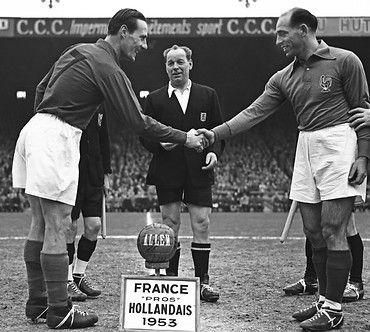
Bram Appel
Abraham Appel was born in the Hague in 1921. His father owned a racehorse training grounds but young Bram was more attracted to football than horse racing. Nevertheless he began as a goalkeeper, before realising his strength lay in the attack. At the time of the outbreak of the second world war in 1940, Appel was playing for ADO in The Hague.
Bram Appel was forced, like many of his fellow countrymen, to go into hiding during the German occupation of The Netherlands. He was trying to avoid being rounded up work as a slave labourer in the German war machine. His efforts were, however, in vain. He was just twenty-one years old when he was picked up in a raid. Appel’s brother had managed to escape in a nick of time but Bram was given two hours to collect his belongings and report for transport to Germany to work as a forced labourer in the German war machine. Had he not showed up, his parents would have been shot. Appel was sent to Berlin, but his footballing skills earned him reprieve from the factory. He had already played for Dutch clubs before the war and so with the

permission from the Dutch football association he began to play for the local club Hertha Berlin. He was then selected for a Dutch national team consisting of forced labourers and played a number of international matches in this capacity. Appel, who played as Leo Appel because Bram was too Jewish for the Germans, was by far the best player on this makeshift team. He scored at least ten times but the exact number is unknown.
After the War Appel returned home and sought to pursue his football career. He did have some difficulties as he had a conflict with Karel Lotsy who tried to label Appel’s behaviour as collaboration even though Lotsy himself was often in attendance at these matches with top Nazi officials. Appel settled with Sittard and his outstanding abilities developed.
In 1948 Bram Appel was selected to join the real Oranje in its first post-War tournament, the 1948 Olympic Games in London. There he showed by scoring two goals in his first match that he was a great asset to the golden inner trio of Lenstra, Wilkes and Rijvers. The following year, however, Appel’s Oranje future appeared to be finished when he followed the Wilkes exodus and went to play professionally in France with Reims. Appel became one of the outstanding players in the French first division scoring 96 goals in 154 league matches during the course of five seasons.
In 1953 the dikes in Zeeland burst and thousands lost their lives. Appel, along with Theo Timmermans, took the initiative to organise a fund-raising match between the Dutch professionals abroad and the French national team. The money earned would be sent to the victims of the flooding. The match took place in Paris and Holland won 2-1 with Appel scoring the game winner. The KNVB refused to allow the rematch to take place on Dutch soil regardless of the relief money it could raise. Nevertheless the remarkable career of Bram Appel had seen him as the only Oranje international who also played on both unofficial national teams.
When football was professionalised Appel returned to play in Holland. He was again selected to play for the national team, but as he was well into his thirties his peak was behind him. Upon his retirement, Appel only played for the real Oranje twelve times but still scored ten goals. He can be included with the rest of his generation as players of great talent, but victims of circumstance. Like Abe Lenstra, Faas Wilkes and Kees Rijvers, Bram Appel had the ability to be an international star. A player who could have represented his country well and with honour, but the politics of the day restrained these men from achieving what their peers in neighbouring countries could achieve. Despite it all, Bram Appel showed that he was one of the great footballers of his era.
